Browse by Topic
- All
- Activism
- Advocacy
- African Diaspora
- Art & Poetry
- BeFriending Creation
- Biology
- Books We Love
- Climate Change
- Divestment
- Economics
- Environmental Justice
- Featured in the Media
- Fracking
- Friendly Landscapes
- Indigenous Peoples
- Individuals Taking Action
- Meetings Taking Action
- Mini-Grants
- Minutes on Earthcare
- New & Exploring
- Pamphlets for Sharing
- Peace
- Permaculture
- Population
- QEW Position Statements
- Quaker Testimonies
- Racial Justice
- Renewable Energy
- Resources
- Skeptics
- Soil
- Spirituality
- Sustainability
- Theme
- Theology
- Timeless
- Timely
- United Nations
- Volume 37
- Water
- Youth & Young Friends
-
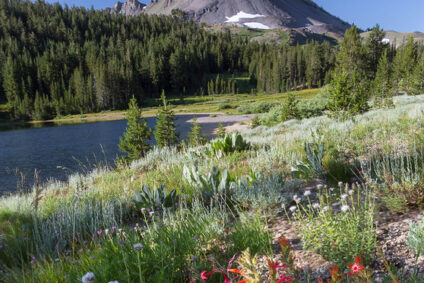
Connection With the Living World
Dear Friends, There is an awakening going on about climate, ecological collapse, and environmental justice both within the Society of Friends and beyond. People are opening up to our message of love and connection with the living world. Our QEW network has expanded over the past…
Read More -
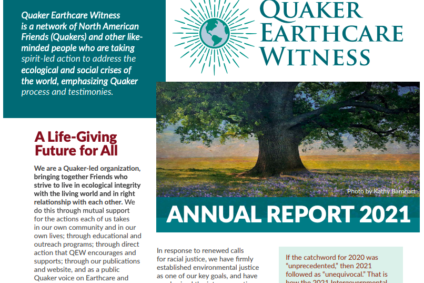
QEW’s 2021 Annual Report
A Life Giving Future For All We’d like to share with you Quaker Earthcare Witness’ most recent annual report. We’re pleased to say that we are growing steadily and building momentum. And we couldn’t have done it without you. Thank you for your generous support of Quaker Earthcare Witness.
Read More -
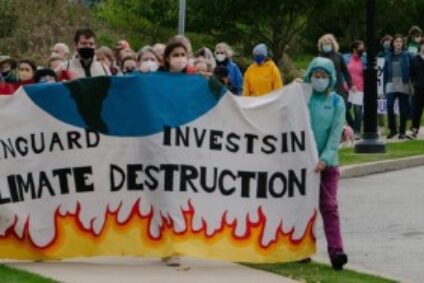
April Earthcare Engagement for Your Community
April marks the beginning of yearly meeting gathering season for many of us in North America. We’re sharing a few resources to help strengthen the connection between Friends in your region and Quaker Earthcare Witness. Please consider taking the following actions as you prepare for your summer events: 1. Invite a …
Read More -
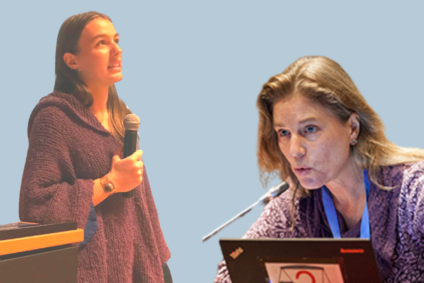
International Climate Policy: From Quiet Diplomacy to Youth Activism
The video is available of the March 15th discussion with Kallan Benson (Fridays for Future USA Director and Friend from Annapolis, MD) and Lindsey Cook (QUNO Representative for Climate Change and Friend from Bonn, Germany). Both Kallan and Lindsey participated in COP 26 in Glasgow, approaching the situation from…
Read More -

March Earthcare Engagement for Your Community
Here are this month’s events along with other resources and a link to our future events. In addition, here is a one page introduction to Quaker Earthcare Witness. Please share this page with your monthly…
Read More -
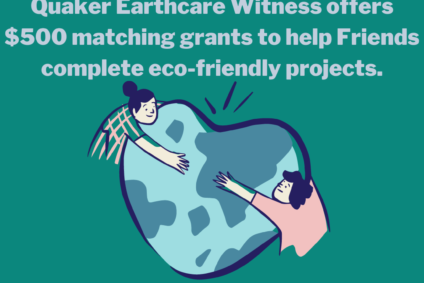
Quaker Earthcare Witness News & Updates
by Shelley Tanenbaum. Quaker Earthcare Witness’ primary goal is to nurture a spiritual transformation in our relationship with the living world. Our efforts include projects, events, and other resources, all aimed at reaching a wider circle of Friends and like-minded individuals and organizations. Over the past two pandemic years, we…
Read More -
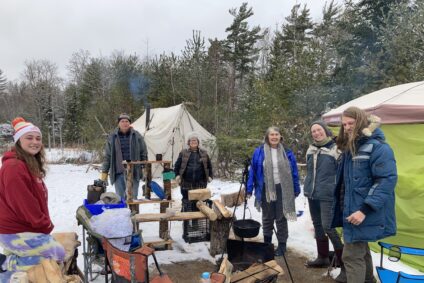
Protecting the Last Hope Wildlife Corridor
by Carol Bradley. One need only look down from a plane, or check out the satellite view of any Crown land forest in Nova Scotia to see just how much clearcutting is going on. Total massacre. Logging roads growing like a cancer across the province. – The Stop Spraying and…
Read More -
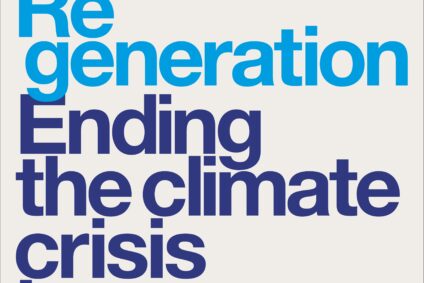
Book Review of Paul Hawken’s Regeneration: Ending The Climate Crisis in One Generation
by Ruah Swennerfelt. Degeneration of land, water, forests, biodiversity, and human health are causes of climate change. And climate change is yet another cause of poverty. Turning this vicious circle to a virtuous one is crucial to addressing the climate crisis. In 1998, my husband Louis and I represented Quaker…
Read More -

Mind the Gap: Quaker Engagement at COP26
by Frank Granshaw and Annette Carter. Our recent trip to Glasgow, Scotland for the UN climate conference for 2021 (COP26) involved a lot of travel by train. We had constant reminders to “Mind the gap when alighting the carriage.” This phrase felt very much in line with the genteel friendliness…
Read More -
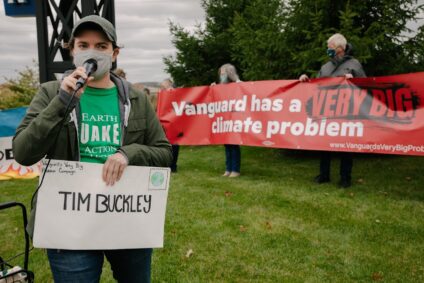
Vanguard Customers Have an Important Role to Play, so Don’t Move Your Money (Yet)!
by Eileen Flanagan. As soon as Earth Quaker Action Team (EQAT) announced that we had joined the international campaign to pressure Vanguard to become a climate leader, we started hearing from Quakers and others who were Vanguard customers that they were eager to move their money to funds that are…
Read More -
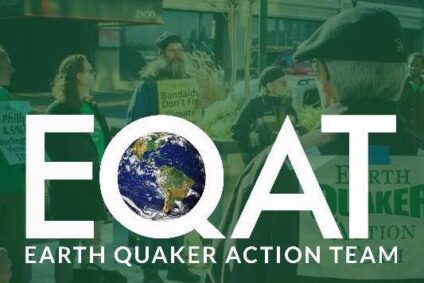
Earth Quaker Action Team Takes on Vanguard
by Jonathan Ogle. The world’s biggest asset managers have a big problem. Companies such as BlackRock, Vanguard, and State Street manage trillions of dollars of investment on behalf of millions of investors. Even while they sign commitments to make their own office operations carbon neutral, they have been investing hundreds…
Read More -
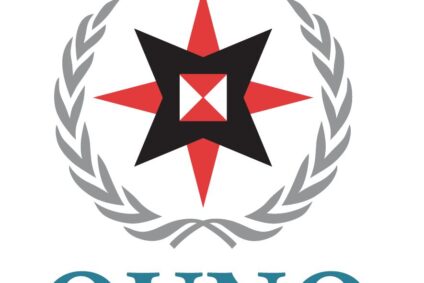
Recognizing a Human Right to a Healthy Environment
by Lindsey Fielder Cook. Recognition of a human right to a healthy environment can have, in the words of the UN Special Rapporteur, “life-changing potential.” The 2010 UN recognition of water and sanitation as a human right led to significantly improved access to clean water and sanitation…
Read More -
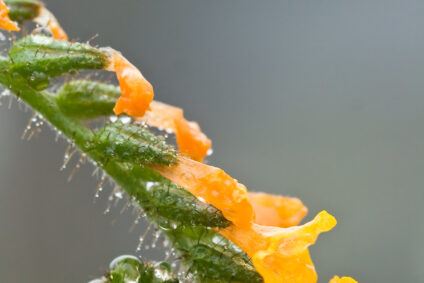
Midwifery
by Pamela Haines. A regular high point in my week is being in touch with a handful of young climate activists. Through a young man who stayed in our spare room while doing student fossil fuel divestment work and then went on to be one of the founders of the…
Read More -
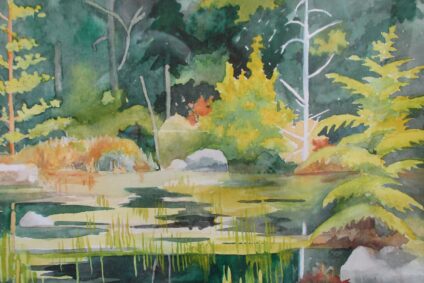
Witnessing the Sacred Depth of Nature
by Mary Conrow Coelho. There are remarkable discoveries now offered to Quaker Earthcare Witness that can greatly strengthen its work and witness. One evening in the early 1990s, a small group gathered to listen to a talk in a video series describing the changes in worldview brought by discoveries in…
Read More -
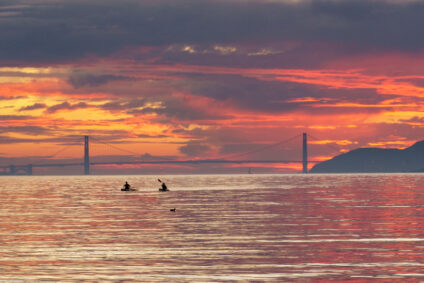
Young Adults’ Workshop: Exploring Ecospirituality
Join Hayley Hathaway, of Quaker Earthcare Witness, for Exploring Ecospirituality: Old & New Ways to Imagine & Transform, a workshop for young adults (ages 18-40). The workshop will be held online, Thursday, February 17, 7:30 – 9 pm Eastern Time. “The world is not a problem to be solved; it…
Read More -
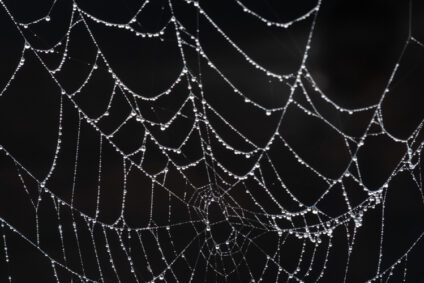
Web of Care for the Earth
Dear Friends, As our beloved outgoing clerk, Mary Jo Klingel, writes: “If the past two years of virtual meetings, workshops, and worship sharings have taught QEW Friends anything, it is how very precious our Earthcare community is.” She continues: Those who work every day for QEW, those who…
Read More -
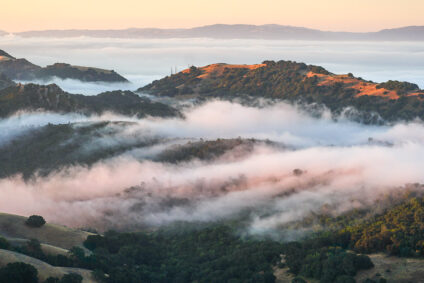
Greetings on the Solstice!
I love this part of the winter holidays—when our sense of wonder and light corresponds to the natural pivot point of the solstice. Since June in the northern hemisphere, days have been getting shorter and shorter, with the shortest day today, on December 21. From this point on, days will…
Read More -
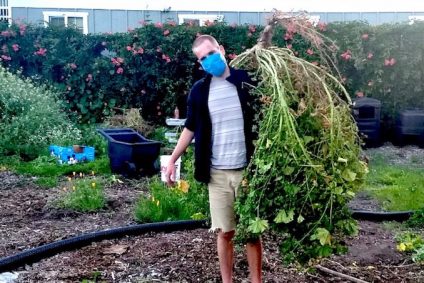
Our Wishlist: 7 Ways to Get Involved
Hello Friends, Our Quaker Earthcare Witness network is filled with gifts. Friends offer their time, financial resources, prayers, experience, expertise, and connections to help our growing community care for the Earth and each other. Here are a few ways we’re hoping you can continue to generously share your gifts this season.
Read More -
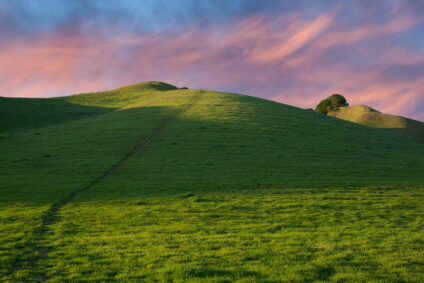
Another World is Possible: An End of Year Message
There is Light all around us. It shows us another world is possible. Let’s open our eyes to see it. When we follow the teachings of nature, we can restore habitat—this happened in Yellowstone National Park when wolves were reintroduced to the ecosystem to restore the natural balance. When we remember…
Read More -
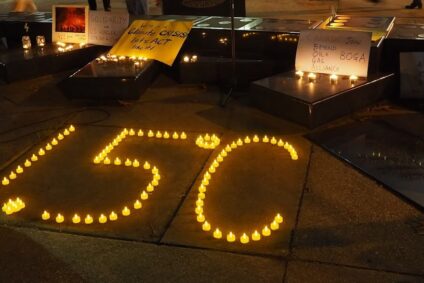
Keep 1.5° Alive The U.N. Climate Change Conference
by Hayley Hathaway. “For those that have eyes to see. For those that have ears to listen. For those that have a heart to feel. 1.5 is what we need to survive. 2 degrees is a death sentence for the people of Antigua &…
Read More -
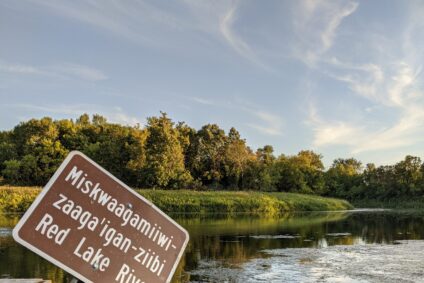
Red Lake Treaty Camp: At The Crossroads
How do you ask a community to be the last to sacrifice their land to support the dying fossil fuel industry? by Shelley Tanenbaum. In September I had the privilege of spending about a week on the frontline at Red Lake Treaty Camp, a spiritual and ceremonial…
Read More -
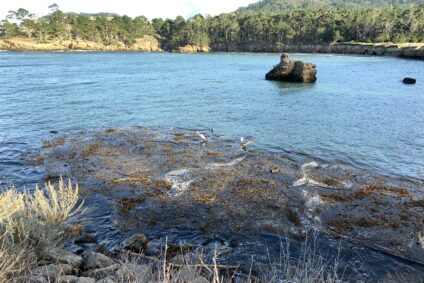
North America the Beautiful: 30×30 Conservation Efforts
by Joseph Cotham. The United States and Canada have committed to the conservation of 30% of the land and waters of the United States by 2030. The U.S.’ 30×30 initiative has evolved into the America the Beautiful campaign, a national call to action that is noteworthy for its goal and…
Read More -
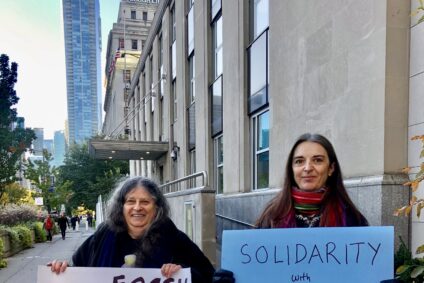
Canadian ClimateFast
by Lyn Adamson. I’m the co-chair of Canada’s ClimateFast, a volunteer-based non-profit dedicated to building strong, informed public pressure to take urgent, substantial and just action on climate change. Our group fasted on the first full day of COP26, November 1, outside of the U.S. Consulate in Toronto as…
Read More -
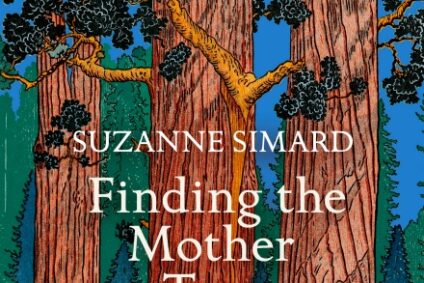
Finding Your Family—In the Forest
BOOK REVIEW by Tom Small. Suzanne Simard, in her first book, Finding the Mother Tree: Discovering the Wisdom of the Forest, has a story to tell. She tells it very well, with a keen sense of the dramatic. And she plays many roles. Foremost, she’s the mystery-story detective. She follows…
Read More -
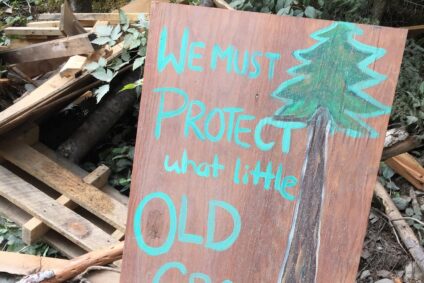
Fairy Creek Blockade
by Hayley Connors-Keith. Content warning: police violence and sexual abuse On August 21, my partner and I went to the Fairy Creek Watershed on Vancouver Island in British Columbia to support the land defenders on the frontlines and protect the last 2% of old-growth forests.
Read More -
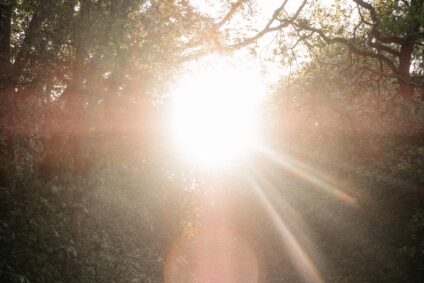
Opening to Our Direct Connection with the Divine
by Marcelle Martin. When I was in my mid-twenties, my graduate school program was not meeting my great longing to understand the nature of reality. I began to seek inwardly. Yearning to know what life was about, I paid attention to my inner experience in a new way. I would…
Read More -
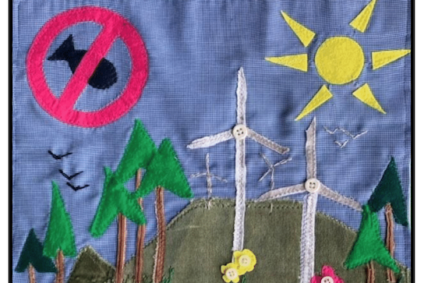
Loving Earth Project: Climate Crisis Textile Art for COP26
A series of exhibitions of textile art was on display in a variety of venues in and around Glasgow during COP26, including at the city’s Quaker meetinghouse. Made by people and communities in many parts of the world, the Loving Earth Project depicts places, people, and things that the artists…
Read More -
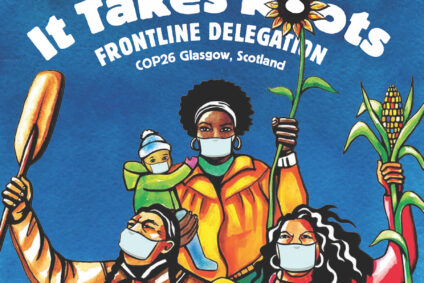
Frontline Communities & Workers Demand Real Climate Solutions, ‘No Net Zero’ and an End to Fossil-Fuels at COP26
It Takes Roots is a multiracial, multicultural, intergenerational alliance of alliances representing over 200 organizations and affiliates in over 50 states, provinces, territories and Native lands on Turtle Island (known as North America). It is led by women, gender non-conforming people, people of color, Black and Indigenous Peoples. This November,…
Read More -
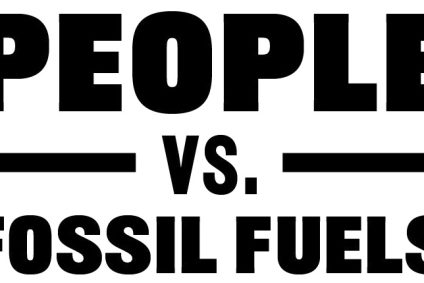
People vs. Fossil Fuels: Build Back Fossil Free Actions
A Fossil Free Future From October 11 to 15, thousands of people will take action at the White House, participate in civil disobedience, and demand that President Biden choose a side: People vs. Fossil Fuels. Indigenous people, pipeline fighters, water protectors, young people, scientists, faith leaders, and more are saying…
Read More -
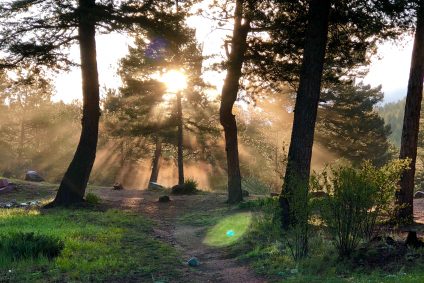
From the Clerk’s Table
by Mary Jo Klingel, Clerk. “Art thou in the Darkness? Mind it not, for if thou dost it will feed thee more. But stand still, and act not, and wait in patience, Till Light arises out of Darkness and leads thee.” – James Naylor I know that…
Read More -
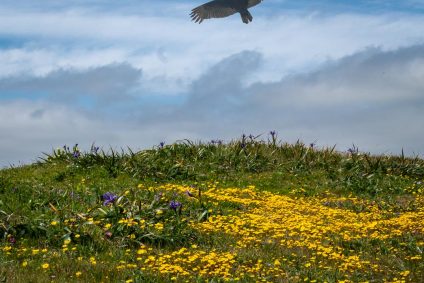
A Vision From Our Divine Source
by Jennie Ratcliffe. Any and all of us who’ve held a vision of transformation grounded in what really sustains us—remembering that we don’t live by bread alone, but by the divine All That Is, that bread is sacred too, and there is no ultimate separation between them—are being called to…
Read More -
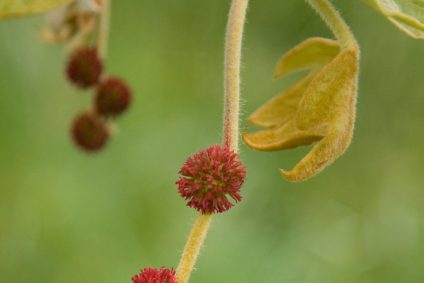
Homecoming
by Mey Hasbrook. Stirring, sap rises into burgeoning buds whose edges unfurl, like fingers opening in friendship. Leaves reach between gaps, become mounds. Earth caresses every curve, sings across seasons: Awaken Love! Open wholly! Embrace Beauty! From slumber, undulate in…
Read More -
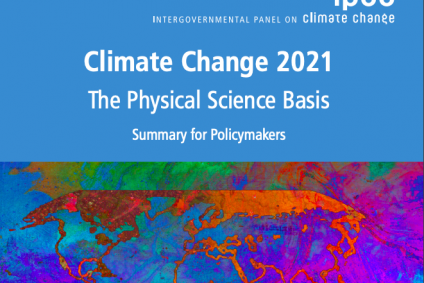
Human-Caused Climate Change is “Unequivocal”
by Shelley Tanenbaum. If the catchword for 2020 was “unprecedented,” then 2021 follows as “unequivocal.” That is how the 2021 Intergovernmental Panel on Climate Change (IPCC) reports scientific evidence that human activities are the cause of climate change, that the climate will be getting worse for several decades, and that…
Read More -
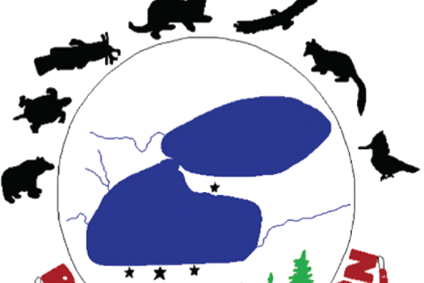
Red Lake Nation’s Path to Solar Energy
by Ralph Jacobson. The people of Red Lake Nation, in northwestern Minnesota, had been talking for over a decade about ending their dependence on electricity generated from coal. This is a story about their journey toward renewable energy. Mercury falls into the water of midwestern lakes from plumes of smoke…
Read More -
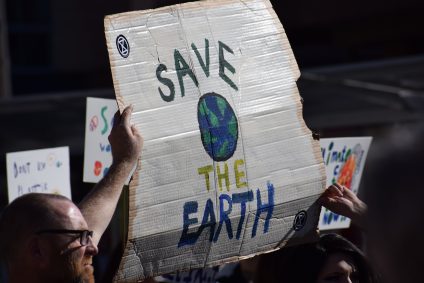
Philadelphia Yearly Meeting’s Climate Sprint
At Philadelphia Yearly Meeting’s annual sessions this July, Friends came under the weight of the climate emergency as a yearly meeting priority and accepted and approved the Climate Sprint Report, “Moving Together in the Face of Climate Change,” excerpted below. To read the full commitment, visit PYM.org. This statement…
Read More -
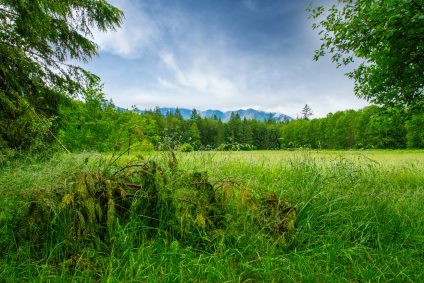
Awakening to Earth: An Earth-Body Meditation
by Bill Cahalan. Bill Cahalan is an eco-psychologist. His booklet, Awakening to Earth, is currently being updated by Quaker Earthcare Witness and will be available to share and download. This meditation is an excerpt. Bill writes, “Here is one version of a guided experience which I have used with weekend…
Read More -
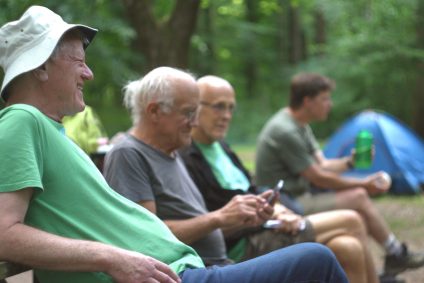
Fresh Energy for Our Witness
by George Lakey. Judging from news accounts of the recent Intergovernmental Panel on Climate Change (IPCC) report, we can expect a fresh dose of anxiety about the future to show up among Friends, even while some of us are reeling from the effects of Covid-19. The report is partly about…
Read More -
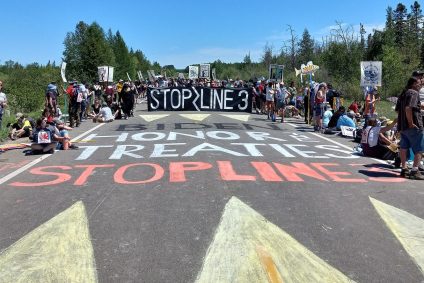
Friends Travel in Faith to #StopLine3
Quakers are coming together to support the growing Indigenous-led movement in northern Minnesota to resist the construction of the Line 3 pipeline. Several Friends participated in non-violent civil disobedience over this past Minnesota winter, several more took part in the June 7 Treaty People Gathering, and others have visited the…
Read More -
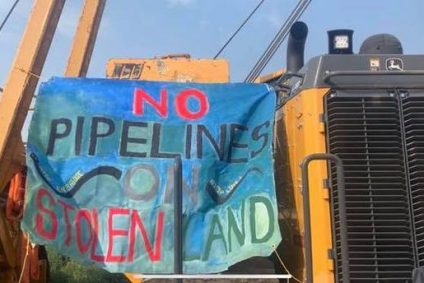
Stop the Line 3 Pipeline
“People are giving everything they have to defend this beautiful place and to stand up for future generations. Young people are stepping up to the plate, their future is on the line. This is an extension of the fight that is happening all over Mother Earth, protecting the last beautiful…
Read More -
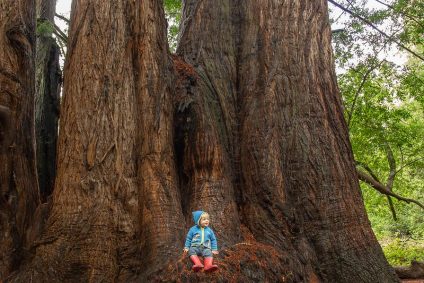
Wildfire Lessons: QEW’s Work in 2021
By Shelley Tanenbaum. Dear Friends, Last year’s wildfires were different than in years past. In California, forests have evolved to not just live with fire, but to thrive because of it—fires clear brush and release seed for the next generation. Mature trees survive mostly intact. Yet this past…
Read More -
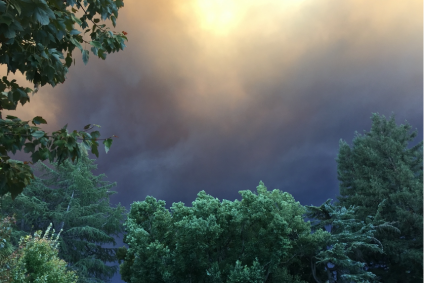
Engaging with Ecological Grief
By Gayle Matson. Recently a Friend in my Quaker meeting spoke movingly of her sadness upon visiting a favorite place that had been ravaged by fire last year. Many of us can relate to that shock and dismay of discovering that a landscape or ecosystem we dearly love has…
Read More -
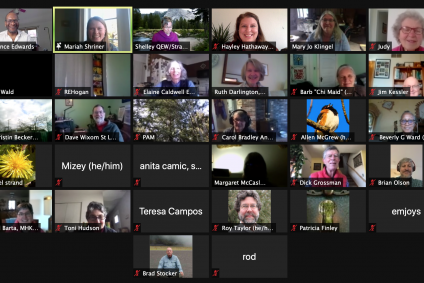
Quaker Advocacy on Sustainable Energy & Environment: Interview with FCNL’s Clarence Edwards
Clarence Edwards leads Friends Committee on National Legislation (FCNL)’s work on sustainable energy and environmental policy as Legislative Director. He brings to FCNL extensive experience in government relations, issue advocacy, and strategic communications. Clarence joined Quaker Earthcare Witness for our April Steering Committee Meeting. Here Clarence answers questions from…
Read More -
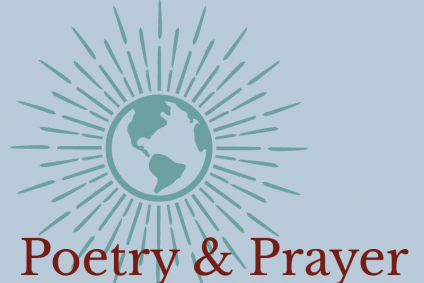
Poem: Prairie Prayers
By Allen McGrew Keen-eyed at dusk, the owl o’er the prairie glides as though on the wings of prayer, and the prayer she prays is a prayer for prey. And the prey? Furtively, he through the tall grass slides like…
Read More -

Poem: Hope Springs Eternal for The Flimsy Soul
By John Heimburg You know him…. but not really. The one who never knew Unconditional Love. For whom the siren song of Transactionality calls………… a never-ending Quest for Acceptance…
Read More -

Rebuilding Infrastructure
By Muriel Strand Many people believe we must rebuild our infrastructure. Unfortunately, almost everyone believes we must rebuild our fossil fuel infrastructure—roads, bridges, dams, ports, rail, pipelines, etc. What we need instead is to rethink our relationship with energy and return to a human-scale infrastructure that puts our real…
Read More -
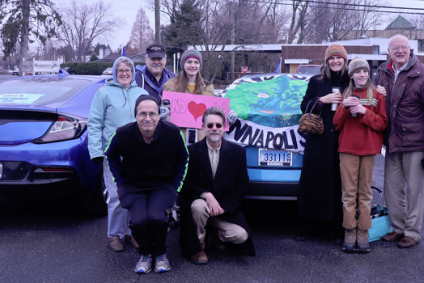
Peak Oil Has Come and Gone!
By Bob Bruninga For decades, peak oil has been a term used to describe the anticipated dwindling supply of oil with anticipated skyrocketing prices due to scarcity and competition for resources. It turns out that the opposite has occurred as the demand for this obsolete, inefficient commodity has…
Read More -
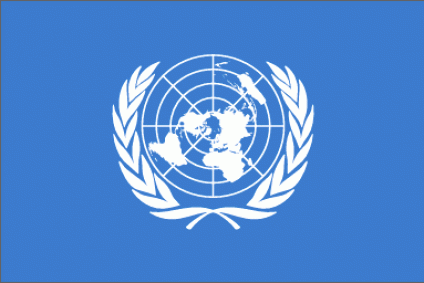
Introduction to QEW’s United Nations Working Group & Diaspora Earthcare Coalition
Quaker Earthcare Witness (QEW) has been a non-governmental organization (NGO) of the United Nations since 1999, holding four UN agency accreditations with the mission of bringing a spirit-led Quaker voice to UN deliberations on the environment. Our accreditations are: General Consultative Status with the Economic and Social Council (ECOSOC) Associate…
Read More -
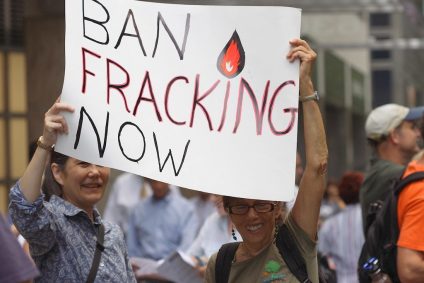
Fracking 101
A Short Definition Hydraulic fracturing, commonly called fracking, is a drilling technique used to extract natural gas or oil from deep underground. Fracking is a controversial practice that has been shown to lead to dangerous and damaging results. Communities’ water sources can be jeopardized by the leak of chemicals used…
Read More -

Divestment as Lived Faith
Friends around the world are taking steps to make their lives reflect changes crucial to the survival of life on Earth. Many consider divesting from fossil fuels as one such step that is consistent with Quaker values and testimonies. Friends are not alone in this consideration; other religious denominations have…
Read More -
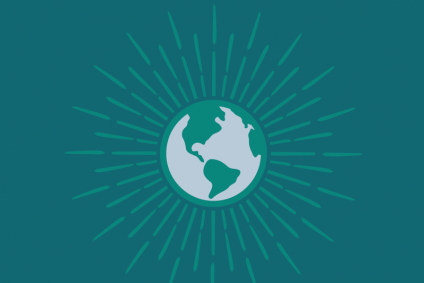
Youth-Led Quaker Grassroots Projects
Quaker Earthcare Witness is pleased to share the news about three mini-grant recipients in 2020 and 2021: New Garden Friends/Guilford College Environmental Justice Internship: New Garden Friends Meeting was awarded funds to match commitments from New Garden Friends Meeting, Guilford College, and North Carolina Interfaith Power and Light to…
Read More -
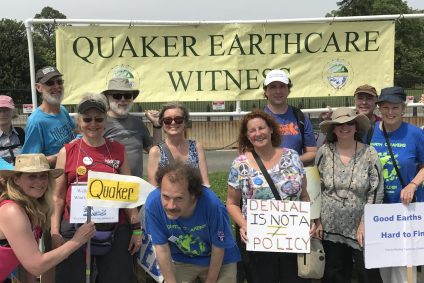
Where’s the Hope in That? A Message from Quaker Earthcare Witness
My name is Mary Jo Klingel, and I am a member of Quaker Earthcare Witness and have served as clerk. I want to share with you about a forum I facilitated on earthcare for my meeting in Charlotte, NC. Near the end of the forum, a man who had been…
Read More -
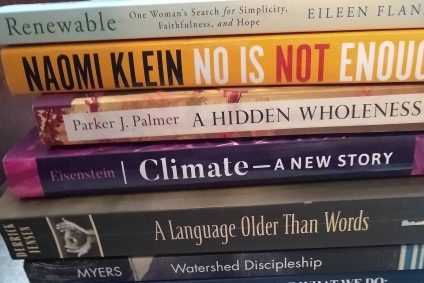
QEW’s Favorite Books
We asked QEW members to share their favorite books. Happy reading! Books to Read for These Times: Climate: A New Story by Charles Eisenstein. “How changing the ‘climate’ of our thinking and rhetoric can influence how we deal with physical climate change.” The Parable of the Sower by Octavia Butler. “About…
Read More -
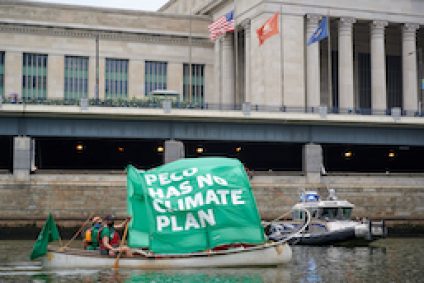
EQAT AT 10: Finding Resilience in an Unimaginable Year
By Lee McClenon. In the last few decades, some social scientists studying organizations have recognized that organizations are healthiest when they embrace a bit of unpredictability. In this model, networks are more powerful than individuals. Resilience is more important than brute strength. And a groundbreaking idea can come from anywhere.
Read More -
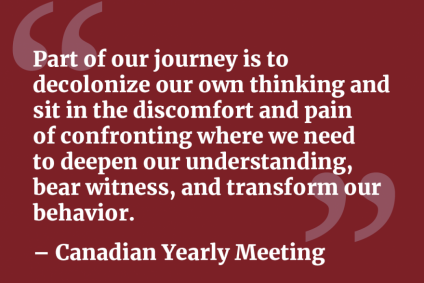
Examining Institutional Racism
By Lauri Langham. The intersection between environmental justice and racial justice is a busy one. We recognize how Black, Indigenous, people of color (BIPOC) and low-income people are the frontline communities that suffer the first and worst effects of planet destruction and climate change: from the placement of toxic dumps…
Read More -
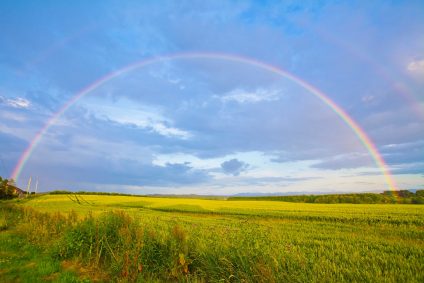
Contemplative Action in the Time of Climate Change
Share This Article This article is part of our Pamphlet for Sharing Series Download PDF By Tom Small and the QEW Publications and Spiritual Nurturance Committees. We live in the time of The Long Emergency, and the Age of Unintended Consequences. Every morning…
Read More -
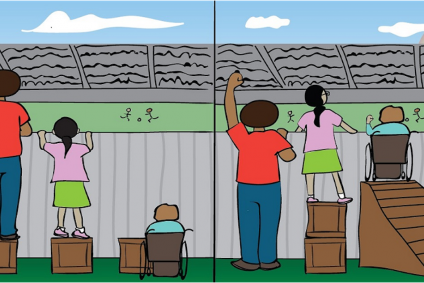
Equality -> Equity -> Justice: The Transportation Case Example
By Beverly Ward “Our equality testimony flows inevitably from our belief that there is that of God in every person. If we believe in Equality, we must work for Justice. British Friends remind us: ‘Are you alert to the practices throughout the world which discriminates against people on the basis…
Read More -
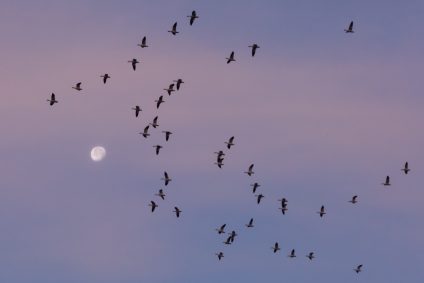
Pleasing the Divine with Evolutionary Love
By Jose Aguto History is littered with the graceless exits of despots clinging to the chimera of the temptation of secular power for personal glorification above the good of others. We know this from the Gospels as one of the three temptations the devil offered to Jesus, which he in…
Read More -
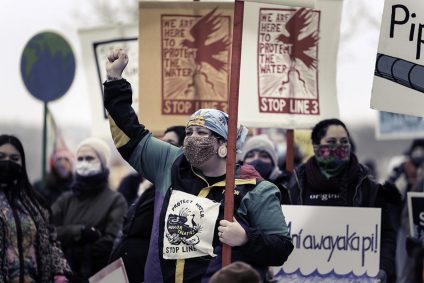
Build Back Fossil Free
By Hayley Hathaway and Ruth Darlington. “If we’re going to Build Back Better, we need to do better. And that starts by putting Indigenous people and their voices first, before any [fossil fuels] project is put in place…It is our Indigenous right to protect what little we have left,” shared…
Read More -
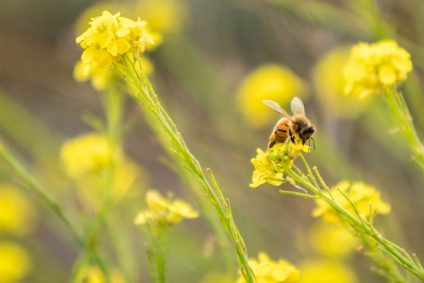
Permaculture: The Art of Designing Beneficial Relationships
By Carol Barta. Permaculture is said to be “the art of designing beneficial relationships.” Permaculture is a design science rooted in the observation of natural systems, the wisdom of traditional farming methods, and systems thinking. It uses both ancient wisdom and modern scientific and technical knowledge to create sustainable habitats…
Read More -
Fracking 101 Glossary
Helpful Terms to Better Understand Fracking Clean Water Act of 1972 – national legislation which established the basic structure for regulating discharges of pollutants into the waters of the United States and regulating quality standards for surface waters. (www.epa.gov) Energy Policy Act of 2005 (Halliburton Loophole) – legislation…
Read More -
The Myth of a Century of Natural Gas in the U.S.
In arguing against fracking, it is important to debunk the myth that the U.S. has enough natural gas reserves to fulfill our need for the next 100 years. It is equally necessary to discuss the plan by gas companies to make the export of natural gas the next big…
Read More -
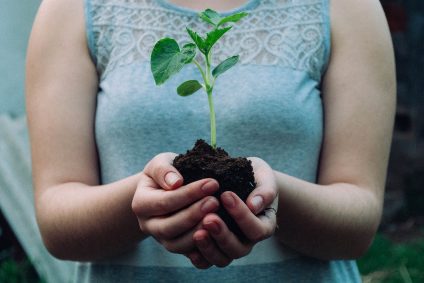
Quaker PopOffsets
Are you concerned about your “carbon footprint”? QEW’s Population Working Group can help. QEW’s Population Working Group offers an innovative program to help confront climate change and other environmental problems. It is based on a similar program in England – “PopOffsets” – an offshoot of the British organization Population Matters.
Read More -
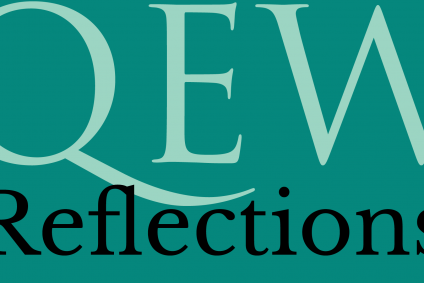
What I’m Learning From the Pandemic
By Shelley Tanenbaum. EVERY YEAR WE Friends ask ourselves, “How has truth fared for Thee?” It is a way of refreshing ourselves, of self-evaluating personally and in our Meetings. It gives us an opportunity to change course and to respond to emerging leadings. What if we see the coronavirus pandemic…
Read More -
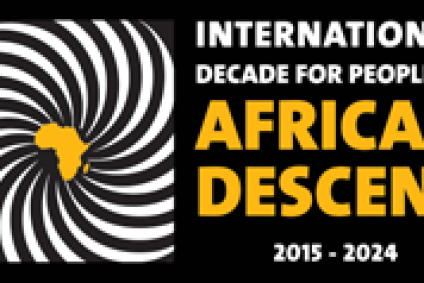
United Nations International Decade for People of African Descent
United Nations International Decade for People of African Descent The United Nations (UN) commemorates international decades to focus world attention on a specific topic, and then mobilize resources to respond. In December 2013, the U.N. General Assembly proclaimed the decade of 2015 through 2024 to be the International Decade…
Read More -

Truth Is Something That Happens
by Louis Cox. DO YOU SWEAR that the testimony you are about to give is the truth, the whole truth, and nothing but the truth, so help you, God?… Early Quakers were known for their refusal to take such oaths in a court of law (often at the…
Read More -
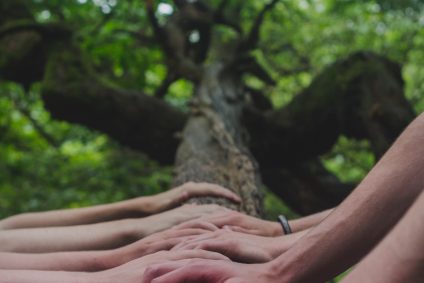
Why a Specifically Quaker Testimony on the Environment?
By William Beale. SINCE THERE ARE MANY excellent organizations actively working to improve our relation to the planet, is there any need or place for a specifically Quaker organization to address the same concerns? The fundamental environmental questions we face are essentially religious: What is our place in the…
Read More -
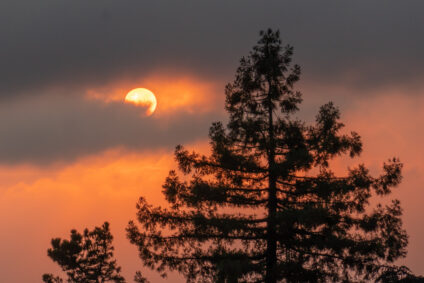
A Shared Quaker Statement: Facing the Challenge of Climate Change
[Last update: June 2017] “It would go a long way to caution and direct people in their use of the world, that they were better studied and knowing in the Creation of it. For how could [they] find the confidence to abuse it, while they should see the…
Read More -
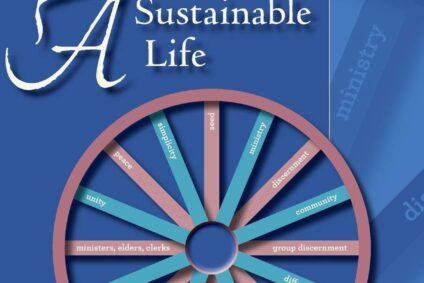
Q&A with Douglas Gwyn
Doug Gwyn, the author of A Sustainable Life: Quaker Faith and Practice in the Renewal of Creation, generously agreed to be interviewed for this issue of BeFriending Creation. Thanks, Doug! 1. You explain how your thought and interests developed through several books, always including the thread of your concern for the Earth. Was…
Read More -
Review: Coming Back to Life: The Updated Workbook to the Work that Reconnects
by Quaker Earthcare Witness. Coming Back to Life by Joanna Macy and Molly Young Brown is expanded and updated from their book of the same name published in 1998 (New Society Publishers, 2014, Gabriola Island, BC). The Deep Ecology work of Joanna Macy, also called…
Read More -
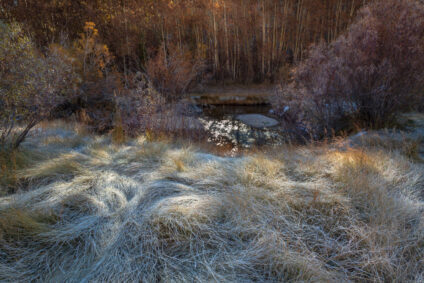
Important Reasons to Use Native Plants
Important Facts. Native plants are adapted to the local area and its climate. Unfortunately, many of our beautiful non-native garden flowers provide little or no food for honeybees, native pollinators, songbirds, and other wildlife. Non-native plants have the potential to become invasive species – weeds that spread rapidly and often crowd…
Read More -
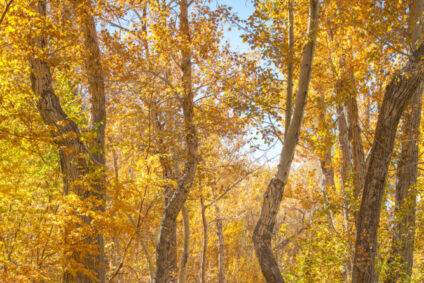
The Spiritual Basis of Earthcare
QEW’s PROGRAMS and publications stem from a conviction and consciousness that the global crisis of ecological sustainability is at root a spiritual crisis. Even as individuals in our network or our steering committee support political and social action in numerous areas, such as globalization, population, genetic engineering, and toxic pollution,…
Read More -
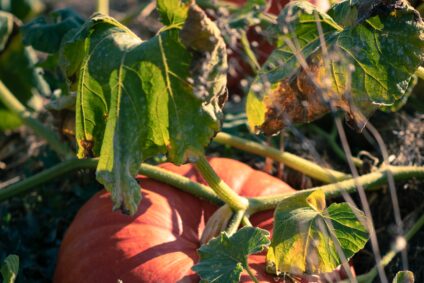
Ecological Principles of Permaculture
Three important ecological principles of permaculture are: The role that each organism plays, the niche it occupies; Understanding succession in natural ecosystems and using it to heal the soil and bring forth both annual and perennial crops; and including as much diversity in the garden space as possible, both of…
Read More -

Black Butterfly: Interview with Artist Damita Hicks
Damita Hicks is a Bahai artist living in Chapel Hill, North Carolina. Her paintings center on Mama A’free’ca, Nature, and racial unity. Kirsten Bohl of Durham (NC) Friends Meeting speaks with Damita here. How did you get started with painting? I’ve been painting almost all my life. In terms of…
Read More -

In the School of the Shipwreck
by Noah Merrill. Editor’s Note: Noah wrote this piece in spring 2020 and his reflections speak to us still. These are the only genuine ideas; the ideas of the shipwrecked. All the rest is rhetoric, posturing, farce. —José Ortega y Gasset JUST OFF THE shore…
Read More -
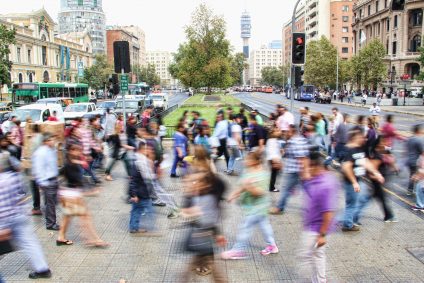
Caring About Population
By Richard Grossman. Most Friends are careful stewards of our environment. Indeed, more than half of Yearly Meetings have added “Stewardship” (or the equivalent) to their short list of Testimonies. However, sometimes we don’t make the connection between our stewardship of Earth and human population. OK, I admit it: the…
Read More -

A Prayer for the New Year
By Pamela Haines As we head toward a new year, let us: Take in the environment around us with relaxed awareness—appreciating beauty and opportunity, noticing threats, staying grounded in the midst of both; Cultivate gratitude, for spaces that have opened in our society, for all the forces of goodness around…
Read More -
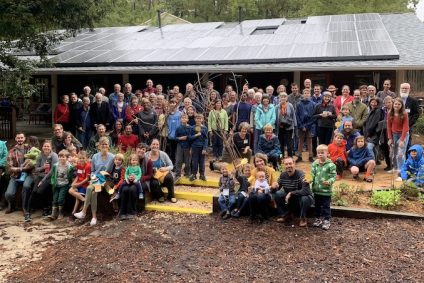
Durham Friends Install Solar Panels
By Dale Evarts. IN AUGUST 2019, following a spiritual leading to live in harmony with Creation by harnessing the energy of the sun to power our meetinghouse, Durham Friends Meeting (DFM), a member of the North Carolina Yearly Meeting Conservative, began generating electricity from solar panels installed that summer. After…
Read More -
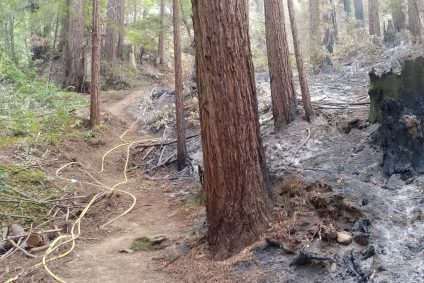
Redwood Renewal
By Shelley Tanenbaum. THE STORY OF redwood renewal through fire gives me hope in a world gone mad with doom and gloom. What can we learn from one of nature’s most elegant ecological systems that evolved to not just cope with adversity, but to turn adversity into rebirth? The few…
Read More -

Galápagos: Lessons from Finches, Marine Iguanas, and Islands
Now, as we careen into the Anthropocene era, the human species has seemingly become the prime mover of ever-accelerating change; but we are nonetheless subject to it. Subject to inexorable processes of evolution. “In this changing world everything is subject to change,” says the Isha Upanishad. The…
Read More -
Friends Meeting at Cambridge
Divestment Minute from Friends Meeting at Cambridge Following is the divestiture minute the Friends Meeting at Cambridge passed in early October. The minute is to Friends Fiduciary Corporation in Philadelphia where we have meeting funds; at the time of the writing of this minute, FFC had more than 6 percent…
Read More -
Canadian Yearly Meeting
Minute on Harmony with Nature (approved August 2001) Canadian Yearly Meeting website: http://quaker.ca/ Friends believe we are all manifestations of the Creator, the Divine Spirit, God. As our knowledge has grown, we have come to realize that indeed all life forms are exquisitely interrelated and independent. We envision a Religious…
Read More -
Minneapolis Friends Meeting
Minute on Voluntary Carbon Tax Peace and Social Concerns Committee statement regarding the voluntary carbon tax and the goals of peace, racial justice, and economic justice: Quakers have taken the lead in saying that the US and other nations need a mandatory carbon tax, something to encourage people to buy…
Read More -
Ohio Valley Yearly Meeting
Sustainability Minute (approved August 2, 2002) Ohio Valley Yearly Meeting website: http://ovym.quaker.org/ We of Ohio Valley Yearly Meeting of the Religious Society of Friends believe that the web of life, and each being within it, are expressions of the Spirit. We further believe that all our actions resonate throughout the…
Read More -
Netherlands Yearly Meeting
Sustainable Development as a Quaker Testimony? A Challenge to All Friends (approved 1997) In 1988 Netherlands Yearly Meeting agreed on a minute in which our representative to the 1988 Triennial was asked to request the Triennial in Japan: as a matter of urgency, that the theme of the ecumenical Concilliar Process—Justice,…
Read More -
Philadelphia Yearly Meeting
Minute on Relationship to God's Creation (approved at the January 1998 Session of Interim Meeting) Philadelphia Yearly Meeting website: http://www.pym.org/ The world is God’s creation. How we treat the earth and all its creatures is basic to our relationship with God, and of fundamental religious concern to the Society…
Read More -
New England Yearly Meeting
Minute on Connection with All Creation (approved 1991) New England Yearly Meeting website: http://www.neym.org/ Cultivating a deeper awareness of our connections with all of Creation enables us to live more Spirit-filled lives. Such awareness brings us great joy, reminds us of God’s presence in everything around us, leads us to…
Read More -
Baltimore Yearly Meeting
Minute on Global Warming Approved August 2000 Baltimore Yearly Meeting website: http://www.bym-rsf.org/ Protecting God’s Earth and its fullness of life is of fundamental religious concern to the Society of Friends. The links between human activity, the dramatic rise in atmospheric greenhouse gas concentrations, and the rise of average global temperature…
Read More -
Community Monthly Meeting, Cincinnati, Ohio
Sustainability Minute (Approved May 14, 2000) We of Community Monthly Meeting of the Religious Society of Friends believe that the web of life, and each being within it, are expressions of the Spirit. We further believe that all our actions resonate throughout the symphony of Creation, flowing through space and…
Read More -
IIlinois Yearly Meeting
Minute on the Condition of Human Population and the Earth (approved August 2, 1997) Illinois Yearly Meeting website: http://www.ilym.org/ Today, we are confronted with interacting problems unique in their magnitude. Among the major problems are increasing numbers of people, excessive use of resources, environmental degradation, loss of biodiversity, and the…
Read More -
Southern Appalachian Yearly Meeting — Climate Change
Minute Regarding Global Climate Change (approved 2001) SAYMA Friends: http://sayma.org/top/ SAYMA Friends recognize that unprecedented rate of change in our global climate is causing rising global temperature, diminishing polar ice, changing local weather patterns, and increasing frequency of severe storms. We also recognize that human activity, largely the combustion of…
Read More -
Acadia, Maine, Friends Meeting
Minute on Connection with God's Creation (Approved January 18, 1998) “For me, God is creative, responsive love, binding together all that exists in the universe, manifest to us in the experiences which can bind us, all parts of creation, together in a blessed community.” Bruce Birchard, “This is my Quaker…
Read More -
Patuxent, Maryland, Friends Meeting
Minute on Ecological Sustainability (approved June 6, 1999) Patuxent Friends believe that ecological sustainability should be added to our existing Quaker testimonies—for the following reasons: The concept of ecological sustainability has a spiritual depth. It includes a resolve to live in harmony with biological and physical systems. It also includes…
Read More -
Princeton Monthly Meeting
Minute on Sustainability (Approved October 13, 1996) We, as Friends, are disturbed by the increasingly numerous, and increasingly severe, environmental problems besetting our world. We deplore environmental degradation as well as attempts by groups and individuals to eliminate such protections of the environment as are already in place. As Friends,…
Read More -
Reading Monthly Meeting
Minute on Sustainability (Approved February 16, 1997) We recognize that all lives, and the earth and its resources that sustain us, are gifts from God. We reaffirm that our Testimonies, Concerns, and Queries as considered together can help us realize the stewardship needed to sustain our communities as part of…
Read More -
Santa Barbara Friends Meeting
Friends Called to Consider World Population (Approved June 13, 2004) In the middle of the seventeenth century, when Quakerism was founded, there were over 600 million people on Earth; now there are more than six billion. The human population is growing at the rate of 3,000 every twenty minutes, while…
Read More -
Stony Run and Homewood Friends Meeting
Minute in Support of the Diversity of Life (approved 2001) The universal processes that establish and maintain the forms we find in nature, including those forms we call “life,” are a manifestation of the Divine in which we are blessed to participate. In the manner of continuing revelation we are…
Read More -
Swarthmore Friends Meeting
Minute on Living in Harmony with Nature (Approved February 9, 1997) The world is undergoing a number of ecological crises that threaten the survival of many living things, including humankind. Ozone depletion, climate change, the widespread presence of toxic substances in the earth’s air, water and soils are among the…
Read More -
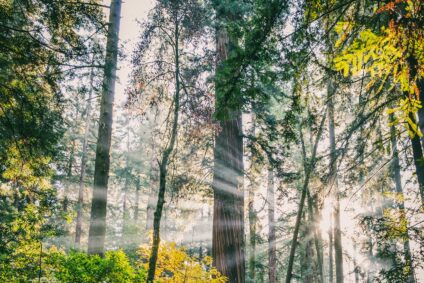
Wellsboro Monthly Meeting
(Approved December 8, 1997) The historic testimonies of the Society of Friends concerning simplicity, stewardship, equality and peace are widely recognized. Not so widely recognized are the interrelationships among these testimonies. Overpopulation and the misuse and overuse of resources are inextricably intertwined with poverty, injustice and illiteracy. These conditions are…
Read More -
Annapolis Friends Meeting
A Minute on Climate Change Concerns and Policies “The earth is the Lord’s and all that is in it.” Psalm 24:1 The Religious Society of Friends (Quakers) testimonies of Simplicity, Peace, Integrity, Community, Equality and Stewardship are our guides in dealing with the challenges of global warming and climate change.
Read More -
Southeastern Yearly Meeting
Minute on Climate Change Southeastern Yearly Meeting approved a minute on climate change at our most recent Gathering, in April 2014. The minute is the result of a full year’s work. It was first read at our Gathering in 2013. Our Earthcare Committee asked each Monthly Meeting to season the…
Read More